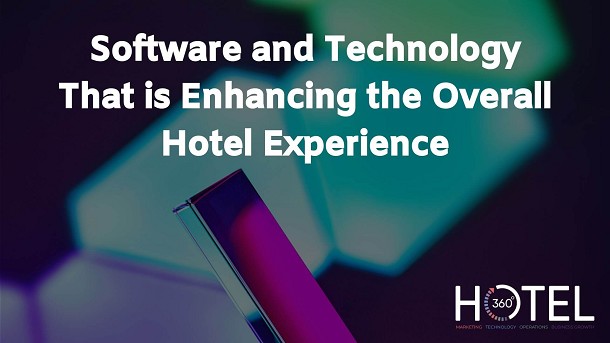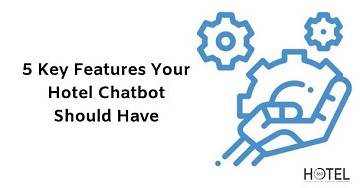5 Key Features Your Hotel Chatbot Should Have
Most hoteliers are now seeing the merits of using chatbots to foster engagement with potential customers. In fact, a survey by Oracle revealed that 80% of businesses want to deploy a chatbot by 2020. Hospitality is one of the most popular use cases for this technology. This is because the market for hotel rooms is highly competitive, making any technology that has the potential to promote customer engagement a key source of competitive advantage for hoteliers.
The challenge is that all chatbots are not the same and there is an information gap between hoteliers and providers. This article will help you identify the key features that a good hotel chatbot must possess, in order to be useful to your hotel.
1. Your Chatbot Must Solve Real Operational & Sales Challenges
A chatbot is simply a tool you use to achieve something. To start with, you need to be fully aware of the issue you want your chatbot to solve. Then, you need to be updated on how the chatbot you’re considering for your hotel will help you resolve that challenge. Chatbots today can help you solve challenges like customer engagement, direct bookings, upsell etc.
If, for example, you wish to boost your direct bookings, you should find a chatbot that can increase your control over your sales processes. Ensure it is connected to your booking engine and excels in collecting the contact details of customers who are looking for a hotel room. This is important because in the event the customer doesn’t book with you, your sales team can take over right then, or talk and try to convince the customer at a later time.
Take another example. If you’re trying to improve customer support, your chatbot should be able to instantly find and deliver the information your guests are looking for. Or, it should be able to channel their requests to your staff seamlessly.
2. Your Chatbot Must Have Pre-existing Hospitality Training
Chatbots are not humans, and the quality of their interactions depends on their cumulative experience. Chatbots require to be fed a great volume of interactions to be able to work properly. Hence, you want a virtual assistant that has already been prepared for hospitality. Yes, customizations are always possible, although a serious hotel AI provider must ensure that your chatbot covers at least 80 – 90% of your use case.
3. Your Chatbot Should Cover Instant Messaging Channels
Chatbots can scale your one-on-one customer interactions. So it’s a good idea to expose them to your customers to the maximum extent. Most chatbots are Facebook-related, mostly because they are easy and inexpensive to build and all you need to do is place the Facebook chat widget on your website. But you should note that they are limited in their scope, which is why they must be avoided:
- Everyone does not use Facebook.
- You cannot collect the contact details of potential customers through Facebook chatbots. After a certain amount of time has lapsed with no activity, Facebook will not allow you to contact the customer anymore.
- Facebook can shut down at any given time. In 2018, all Facebook chatbots were suspended during the time the company reviewed its security standards.
However, Facebook should be included as one of your communication channels. Your chatbot should also be able to manage your SMS, live chat, WhatsApp, Booking.com, Airbnb etc. This ability to compile all your major guest communication channels onto one easy-to-use platform is essential in order for your staff to easily adopt it.
4. Your Chatbot Should Interact Efficiently With Your Hotel Staff
Your chatbot interacts with not just potential customers, but with your staff as well. It passes on customer information and their needs, or requests backup from the staff. Thereby, your chatbot’s ability to interact efficiently with your team is vital. This makes your notification center just as important as the artificial intelligence component of your bot.
Effective chatbots can interact with the front desk and your sales department via:
- Emails: The bot sends the staff a succinct email summarizing a customer request with a clear call for action.
- Browser notifications: The bot sends visual and sound alerts while your staff is active on an Internet browser. It is especially useful if you use a cloud PMS as your teams are constantly on Google Chrome.
- Native desktop notifications: The bot sends visual alerts and calls to action directly from the front desk computer. This ensures that the reception never misses an important message, especially if you have a traditional PMS and your teams do not visit Chrome every day.
- Mobile app notifications: When the hotel staff is on the move, mobile apps are very useful for interaction between the chatbot and the staff. The app sends alerts that will intimate the staff and let them take over when needed.
5. Your Chatbot Should Be Capable of Managing Various Languages
Your guests are from all across the globe. Thus, the ability to manage various languages is an essential feature that your bot must possess. Don’t touch a bot that requires you to script all the answers because it will be very complicated to keep your information updated. Choose chatbots that can process your rough data and form their own sentences. Then, when you update a data point, the changes are automatically passed through all languages instantly.
Artificial intelligence is already changing the face of hotel e-commerce significantly. I hope these guidelines will help you in choosing a chatbot that best fits your business.
If you’d like more information on hotel chatbots, feel welcome to visit our website: quicktext.im or contact me at bde@quicktext.im.
READ NEXT: Software and Technology That is Enhancing the Overall Hotel Experience



